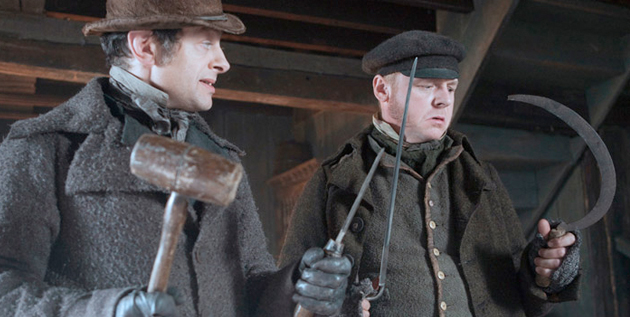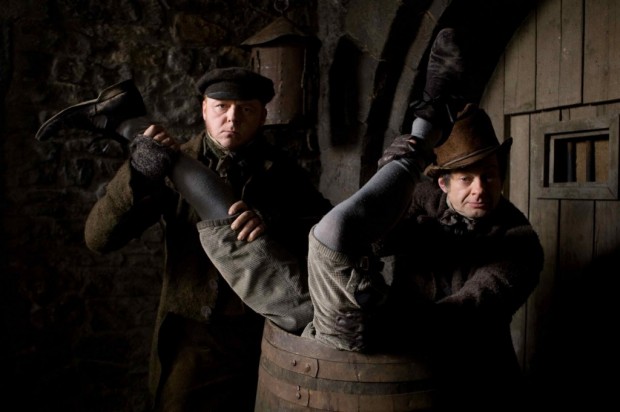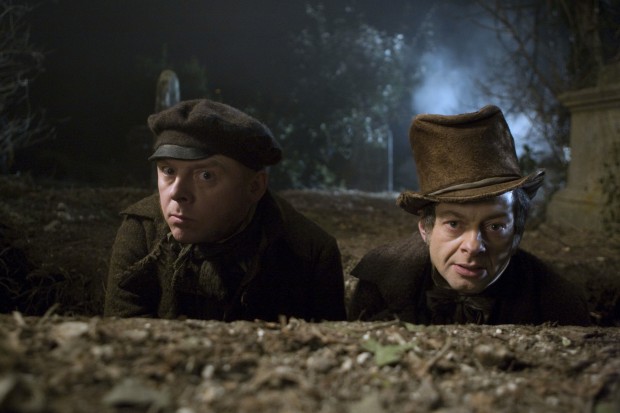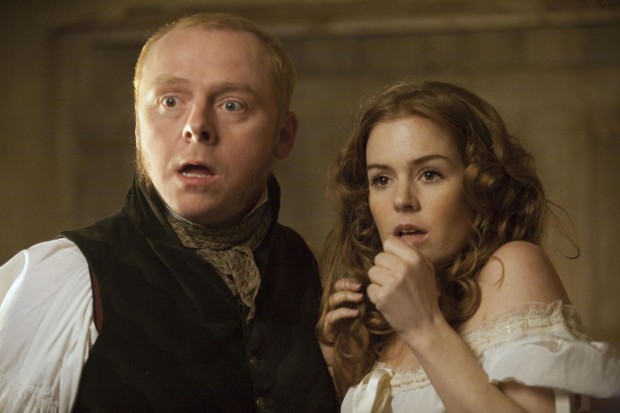When given the opportunity to interview John Landis, I had to take it. After all, this is a man whose films I’ve grown up on (The Blues Brothers may very well be my most-watched movie of all time), so the idea of talking to him was pretty thrilling. Thankfully, it turns out that he’s a great conversationalist.
While we started off with his latest project, Burke and Hare, the discussion soon veered toward the creative state of Hollywood, as well as what he has planned next. There are many other places we could have gone, but I think that the ensuing talk was both informative and enlightening.
Without further ado:
How did this material get into your hands?
John Landis: I was visiting my friend, Gurinder Chadha, who is an English director. Do you know Gurinder?
I don’t know if I do.
You know a movie called Bend It Like Beckham?
Oh, sure.
That’s probably her biggest, most famous film. But she’s an old friend of mine, she’s a British filmmaker, and she — I was in London — has her offices at the Ealing Studios. And she said, “Do you want to come out to Ealing for lunch?” And I said, “Oh, I’d love to.” Because I had never seen Ealing Studios. Ealing is literally the only studio in London, England I haven’t been at. And it’s also the only motion picture studio within the city limits of London; everything else is way outside London. And it’s also, as you know, a very historic place. Where Sir Michael Balcon made all those terrific pictures of the ‘40s and ‘50s. So I was very keen to go down and see the studio.
So I went down with Gurinder, and during lunch, a guy walks by. She introduced me to him — Barnaby Thompson. And he said, “Are you John Landis, the film director?” I said, “Yeah.” He said, “I have a script, would you read it?” And it turns out that Barnaby is the head of the new Ealing Studios. It went out of business in the ‘50s, and the studio itself was a rental lot for years. It’s where BBC used to shoot mostly, where Python shot all their TV shows and all that stuff. So it’s a very historic place. You know, they made Kind Hearts and Coronets, The Man in the White Suit, and, you know — The Ladykillers, and probably the best portmanteau horror film, Dead of Night — just so many great films.
And so I was happy to be there, and he said, “Look, I’m starting the picture company again; would you make this movie for us?” And I read the script, and what I liked about the script — [Laughs] and this is probably very perverse, it’s probably why it’s not what people expect — is that it’s essentially a romantic comedy, which is completely inappropriate for these characters. And the sheer subversiveness of that intrigued me. I said, “Sure, I’ll make this movie.” And we did.
I wanted to know: You’ve been out of Hollywood for a while — you’ve been doing things on television and some documentaries. Was there a certain attraction to this film because you wouldn’t be working in the Hollywood studio system?
No, not really. I mean, the reality is that what you call the “Hollywood studio system” really is the international film business. You know, major, multi-national corporations that the film studios — or the film businesses — are tiny divisions of. So it’s a very different business than the one I came into in the ‘70s. And I was very lucky, in retrospect, to work at a time. When I made Animal House, I could tell you whose company it was. I mean, I could say: “Universal is Lou Wasserman,” and “Paramount is Charlie Bludhorn’s,” and “Warner Bros. is Steve Ross” and “United Artists is Arthur Krim,” and “ITC is Lew Grade.” You could tell me the company, I could tell you the guy who ran it and made the decisions. And they were in the picture business. It’s now much more complicated; they’re in the merchandising business, and they’re in all kinds of businesses. And it’s a different bottom line. It’s not enough to make a movie and make a little money — no one’s interested in that. It’s a very different business.
So, they’re making, you know, Transformers, and comic book movies, and remakes. Remakes and sequels, by the way, they’ve always made; I have no problem with that. But, you know, right now they’re making a film based on the board game Battleship, and Chutes and Ladders and Candyland. [Laughs] It’s all about marketing, and it’s a different business. But nonetheless, I would happily make a studio picture if it was good. I had a very bad experience with my last studio pictures, I kind of walked away. But, no, I’m not… I’ll work for anyone who puts up the money — if it’s good, if it’s interesting.
So, do you feel as if money is absolutely the only thing that matters with studios now, and that quality is irrelevant?
Well, they’ve always wanted to make money. But it’s true: They have no interest in making quality films, but they certainly have an interest in making money. They always did. You know, the film business — film — is only a little over a hundred years old, and the industry has always been called the movie business, show business, the motion picture industry. And the studios were built as factories. The difference was, you had the moguls — the original moguls — these guys, for all of their good at the end, there was toughness; I’m not saying they were nice men. [Laughs] You did have extraordinary people in there. You know, Irving Thalberg, his mantra was, “We make ten for them, and two for us.” Have you ever heard that?
To a certain extent, yes.
That was a famous Irving Thalberg thing. And then, of course, you must understand: I came along at a time when the system was kind of in a chaos, like it is again now. But the difference was, at that time, because of television and many other economic reasons — you know, the Antitrust Act and stuff — the studios were having trouble; they were losing their audience. And the movie business — I guess “the cinema audience” — was decreasing rapidly, and so they tried, you know… CinemaScope and 3-D and Cinerama, and all these different things. And the bottom line is that, in 1969 with Easy Rider’s gigantic success, there came a time in the business — really from Easy Rider, from like 1970 to probably up until like the 1990s — there was a good twenty years where the filmmakers were given more control. Because the conventional wisdom at that time was, “Well, we don’t know what they want, maybe they know what they want!” [Laughs] So you’ve got these exceptional movies; I mean, look at the pictures of the ‘70s. It’s amazing, you know? Universal Studios, within a year of Animal House, they also made Fast Times at Ridgemont High. I mean really good, smart movies. They had a broad range, of course — they made Smokey and the Bandit — [Laughs] but they also made Melvin and Howard and just so many interesting films. And that’s kind of gone now. It’s a miracle that Social Network got made through a studio.
I’m wondering, have you seen anything from a major studio in the past, let’s say, two years that’s really impressed you, that you thought actually worked as a film?
Well, Social Network, I thought that was great. And what else? I mean, I’m sure I have. Pixar continues to make interesting movies, and yeah, I’m sure I have. Don’t ask me to name one; I’d have to look at a list of releases. [Laughs] But it is getting… you know, the days when Paramount are turning out Rosemary’s Baby and Chinatown and, you know, The Godfather — those days are gone. [Laughs] That’s not going to happen again when, within three years, one company will make five classic, brilliant films. I mean, Scorsese’s still making movies, and there’s a lot of great filmmakers working, it’s just a different bottom line. I mean, Tim Burton, same thing — the bottom line is different.
Is there a desire on your part to do something that will get millions upon millions of dollars in box office grosses, and Oscar nominations? Things like that?
Oh, everyone does. All of your power — all of a filmmaker’s power — is based on box office. I mean, Stanley Kubrick: He would not have been allowed to make films, one, with the subject he chose, and two, how he made them, unless his pictures made a lot of money. And my example of that is that I wrote An American Werewolf in London; it’s a silly movie, but nonetheless it’s a personal movie, and I wrote it in 1969, but I didn’t get enough money to do it until 1980. And that was only based on the success of Kentucky Fried, Animal House, and then The Blues Brothers. If those were failures, I wouldn’t have gotten the money. So, of course, you always want to have box office success.
I’m very lucky. You know, when you do anything radical or different — anything, if it makes money, is instantly mainstream. Do you understand that?
Absolutely.
So, like, when you make rock ‘n’ roll. And rock ‘n’ roll is “race music,” it’s “the Devil’s music,” it’s “evil music,” and when General Sarnof and Bill Paley go, “Wait a minute, we’re making hundreds of millions of dollars,” suddenly it’s no longer evil; it’s big business. Like rap music, which was considered to be just the worst kind of terrible influence — worse than comic books. But big business comes along, and suddenly it’s mainstream. You know, they use Che Guevara to sell anything now! So I was very lucky to make pictures that were kind of out there, but they were successful. The fact that they were successful allowed me to make more; that’s what your strength is based on.
I also have to ask how someone like — it’s appropriate because you worked with Simon Pegg — Edgar Wright, who I’m sure you know in some capacity. Right?
I do know Edgar; I’m a big fan of his, by the way. I love both Shaun of the Dead and Hot Fuzz, and I thought that Scott Pilgrim was terrific. I’m a big fan of Edgar Wright’s.
So, when you see someone like him — who is from a different generation of filmmakers, but admires your work and kind of tries to take an influence from you — does that mean a lot to you, or do you try and not focus on things like that, and just do your own thing?
Well I’m delighted by it, because he’s a great filmmaker. I mean, you know, I’ve got a lot to answer for. People say Animal House started a trend, and it’s true, and that doesn’t delight me, because the vast majority of those pictures are shit. And they misunderstand what Animal House was, you know? It’s a different time; it’s a much more conservative time. It really is a strange time, and if you look at pictures…I’ll use Fast Times at Ridgemont High and Animal House as examples. Those were major studio pictures and Hollywood films where, you know, Animal House is a movie that takes place in 1962, and in civil insurrection. OK? [Laughs] Fast Times at Ridgemont High is a high school picture in which a girl has unprotected sex, gets pregnant, and her brother takes her to have an abortion.
I enjoyed Bridesmaids; I thought it was funny, but nonetheless, it had a traditional, classic happy ending, and they tied everything up, and it was all very nice. Hangover: They go back to their wives, they’re all very happy. You know, these are conservative films. The ones that shocked me were Juno and Knocked Up. Juno says that if you’re a high school kid — you have unprotected sex and you get pregnant — that’s fine, because you’ll give the baby away, it won’t affect you, and everything will be fine. [Laughs] In Knocked Up, if you’re Katherine Heigl and you sleep with a jerk and you get pregnant, then he will turn out to be a great guy, and you’ll get married and live happily ever after. It’s a very different message; it’s a much more kind of Republican message going around now. It’s a different time.
You’ve done documentaries and television work over the past ten years, but this is your first theatrical narrative film to come out in almost fifteen years. Did you find yourself employing certain techniques that you hadn’t used in a while, and do you plan to get back into theatrical releases?
Well, I haven’t had to readjust. [Laughs] I don’t know how to react to that! Filmmaking is the same. Whether I’m directing a little, mini thing like Masters of Horror or directing a feature, the skill set is the same. In terms of getting back into theatrical features, absolutely. I’ve never consciously not wanted to make a movie. It’s quite straightforward: The movies I want to make tend to not be mainstream, and the movies that the studios want me to make are movies that I’m not interested in. So, you know, I would love to get a ginormous budget to make a big movie, but my next film, I guess I can tell you, I can announce it. I’m going back to London — not for Ealing, but for a completely independent company — and it hasn’t been announced, but I’m doing a picture that starts shooting in October.
Do you think that will have a lot of mainstream appeal, or is it something that only a certain segment will enjoy?
I don’t know; I hope it has mainstream appeal. I don’t know. I mean, I’ve never, ever made a movie targeting an audience, ever — except I made a picture that I like quite a lot, called The Stupids. That’s my only children’s film. That was targeted and meant for seven-to-ten-year-old children. Everything else I’ve done, I’ve never targeted an audience, because I think that is patronizing. I just do the best I can by the material. And every movie has different rules; you set your rules up, and every film has its own set of rules.
But of course, everyone wants to have a big success. I mean, first of all, success translates into more people seeing your movie. [Laughs] And it’s interesting making independents, because you can have a film that’s like a huge success in one country, and then in another country, it’s kind of a direct-to-video. But it’s fine. You know, I like making pictures; I enjoy it, I’m happy to do it.
Burke and Hare is currently available on VOD, and will open in limited release on September 9th.





